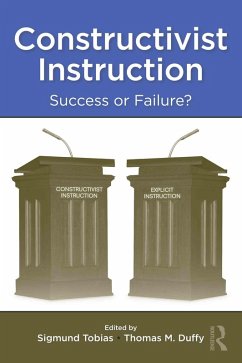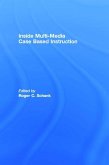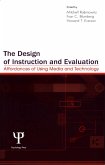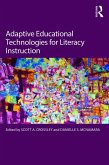Constructivist Instruction (eBook, ePUB)
Success or Failure?
Redaktion: Tobias, Sigmund; Duffy, Thomas M.
63,95 €
63,95 €
inkl. MwSt.
Sofort per Download lieferbar

32 °P sammeln
63,95 €
Als Download kaufen

63,95 €
inkl. MwSt.
Sofort per Download lieferbar

32 °P sammeln
Jetzt verschenken
Alle Infos zum eBook verschenken
63,95 €
inkl. MwSt.
Sofort per Download lieferbar
Alle Infos zum eBook verschenken

32 °P sammeln
Constructivist Instruction (eBook, ePUB)
Success or Failure?
Redaktion: Tobias, Sigmund; Duffy, Thomas M.
- Format: ePub
- Merkliste
- Auf die Merkliste
- Bewerten Bewerten
- Teilen
- Produkt teilen
- Produkterinnerung
- Produkterinnerung

Bitte loggen Sie sich zunächst in Ihr Kundenkonto ein oder registrieren Sie sich bei
bücher.de, um das eBook-Abo tolino select nutzen zu können.
Hier können Sie sich einloggen
Hier können Sie sich einloggen
Sie sind bereits eingeloggt. Klicken Sie auf 2. tolino select Abo, um fortzufahren.

Bitte loggen Sie sich zunächst in Ihr Kundenkonto ein oder registrieren Sie sich bei bücher.de, um das eBook-Abo tolino select nutzen zu können.
Bringing together leading thinkers from both sides of the hotly debated controversy about constructivist approaches to instruction, this book presents the evidence for and against constructivism and detailed views from both sides of the controversy. A distinctive feature is the dialogue built into it between the different positions.
- Geräte: eReader
- mit Kopierschutz
- eBook Hilfe
- Größe: 0.84MB
Andere Kunden interessierten sich auch für
![Technology's Challenges and Solutions in K-16 Education during a Worldwide Pandemic (eBook, ePUB) Technology's Challenges and Solutions in K-16 Education during a Worldwide Pandemic (eBook, ePUB)]() Technology's Challenges and Solutions in K-16 Education during a Worldwide Pandemic (eBook, ePUB)41,95 €
Technology's Challenges and Solutions in K-16 Education during a Worldwide Pandemic (eBook, ePUB)41,95 €![Narrative Career Counselling (eBook, ePUB) Narrative Career Counselling (eBook, ePUB)]() Narrative Career Counselling (eBook, ePUB)33,95 €
Narrative Career Counselling (eBook, ePUB)33,95 €![Inside Multi-Media Case Based Instruction (eBook, ePUB) Inside Multi-Media Case Based Instruction (eBook, ePUB)]() Inside Multi-Media Case Based Instruction (eBook, ePUB)62,95 €
Inside Multi-Media Case Based Instruction (eBook, ePUB)62,95 €![The Design of Instruction and Evaluation (eBook, ePUB) The Design of Instruction and Evaluation (eBook, ePUB)]() The Design of Instruction and Evaluation (eBook, ePUB)42,95 €
The Design of Instruction and Evaluation (eBook, ePUB)42,95 €![Cross Reality (XR) and Immersive Learning Environments (ILEs) in Education (eBook, ePUB) Cross Reality (XR) and Immersive Learning Environments (ILEs) in Education (eBook, ePUB)]() Cross Reality (XR) and Immersive Learning Environments (ILEs) in Education (eBook, ePUB)52,95 €
Cross Reality (XR) and Immersive Learning Environments (ILEs) in Education (eBook, ePUB)52,95 €![Adaptive Educational Technologies for Literacy Instruction (eBook, ePUB) Adaptive Educational Technologies for Literacy Instruction (eBook, ePUB)]() Adaptive Educational Technologies for Literacy Instruction (eBook, ePUB)51,95 €
Adaptive Educational Technologies for Literacy Instruction (eBook, ePUB)51,95 €![Serious Play (eBook, ePUB) Serious Play (eBook, ePUB)]() Serious Play (eBook, ePUB)39,95 €
Serious Play (eBook, ePUB)39,95 €-
-
-
Bringing together leading thinkers from both sides of the hotly debated controversy about constructivist approaches to instruction, this book presents the evidence for and against constructivism and detailed views from both sides of the controversy. A distinctive feature is the dialogue built into it between the different positions.
Dieser Download kann aus rechtlichen Gründen nur mit Rechnungsadresse in A, B, BG, CY, CZ, D, DK, EW, E, FIN, F, GR, HR, H, IRL, I, LT, L, LR, M, NL, PL, P, R, S, SLO, SK ausgeliefert werden.
Produktdetails
- Produktdetails
- Verlag: Taylor & Francis eBooks
- Seitenzahl: 392
- Erscheinungstermin: 28. Mai 2009
- Englisch
- ISBN-13: 9781135847920
- Artikelnr.: 38245331
- Verlag: Taylor & Francis eBooks
- Seitenzahl: 392
- Erscheinungstermin: 28. Mai 2009
- Englisch
- ISBN-13: 9781135847920
- Artikelnr.: 38245331
- Herstellerkennzeichnung Die Herstellerinformationen sind derzeit nicht verfügbar.
Sigmund Tobias is Distinguished Research Scientist at the Institute for Urban and Minority Education and Visiting Professor of Cognitive Studies in Education at Teachers College, Columbia University. His scholarly credentials include a long list authored, co-authored, and edited scholarly publications; grants; awards; invited addresses, and conference presentations. In addition, he is one of five former refugees who participated in the documentary film, Shanghai Ghetto, describing how a group of European Jews found safety from the Holocaust in Shanghai, China, during the Second World War, and which which won an Audience Choice Award at the Santa Barbara Film Festival. Tobias returned to Shanghai as a Visiting Professor at the Shanghai Institute of Education, where he began a memoir describing the life of his family in the refugee community in Shanghai. The book was subsequently published as Strange Haven: A Jewish Childhood in Wartime Shanghai. Thomas M. Duffy is the Barbara Jacobs Chair of Education and Technology at Indiana University and the founding director of the Center for Research on Learning and Technology. He is a professor in instructional systems technology and the cognitive science program. His academic career has been dedicated to exploring the design and use of information in education and the workplace. Professor Duffy has written or edited several books and is the author of over 100 papers on learning, performance, and technology. He and his colleagues have also developed the Ready Program (adult literacy instruction), Strategic Teaching Frameworks (multimedia, teacher professional development), and ACT, an asynchronous collaboration tool for small group problem solving.
Foreword, Robert J. Sternberg
Preface
Part I. Introduction
Chapter 1. The Success or Failure of Constructivist Instruction: An
Introduction
Sigmund Tobias and Timothy M. Duffy
Part II. The Evidence for Constructivism
Chapter 2. Reconciling a Human Cognitive Architecture
David Jonassen
Chapter 3. Constructivism in an Age of Non-Constructivist Assessments
Daniel L. Schwartz, Robb Lindgren, and Sarah Lewis
Chapter 4. Taking Guided Learning Theory to School: Reconciling the
Cognitive, Motivational, and Social Contexts of Instruction
Phillip Herman and Louis M. Gomez
Chapter 5. Beyond More Versus Less: A Reframing of the Debate on
Instructional Guidance
Alyssa Friend Wise and Kevin O'Neill
Chapter 6. Constructivism: When It's the Wrong Idea and When It's the Only
Idea
Rand J. Spiro and Michael DeSchryver
Part III. Challenges to the Constructivist View
Chapter 7. What Human Cognitive Architecture Tells Us About Constructivism
John Sweller
Chapter 8. Epistemology or Pedagogy, That Is the Question
Paul A. Kirschner
Chapter 9. How Much and What Type of Guidance is Optimal for Learning?
Richard E. Clark
Chapter 10. Constructivism as a Theory of Learning Versus Constructivism as
a Prescription for Instruction.
Richard E. Mayer
Chapter 11. The Empirical Support for Direct Instruction
Barak Rosenshine
Part IV. An Examination of Specific Learning and Motivational Issues
Chapter 12. Learning and Constructivism
Walter Kintsch
Chapter 13. From Behaviorism to Constructivism: A Philosophical Journey
from Drill and Practice to Situated Learning
J. D. Fletcher
Chapter 14. What's Worth Knowing about Mathematics?
Melissa Sommerfeld Gresalfi and Frank Lester
Chapter 15. "To every thing there is a season, and a time to every purpose
under the heavens" What about Direct Instruction?
David Klahr
Chapter 16. Beyond the Fringe: Building and Evaluating Scientific Knowledge
Systems
Richard A. Duschl and Ravit Golan Duncan
Part V. Summing Up
Chapter 17. An Eclectic Appraisal of the Success or Failure of
Constructivist Instruction
Sigmund Tobias
Chapter 18. Building Lines of Communication and a Research Agenda
Thomas M. Duffy
Preface
Part I. Introduction
Chapter 1. The Success or Failure of Constructivist Instruction: An
Introduction
Sigmund Tobias and Timothy M. Duffy
Part II. The Evidence for Constructivism
Chapter 2. Reconciling a Human Cognitive Architecture
David Jonassen
Chapter 3. Constructivism in an Age of Non-Constructivist Assessments
Daniel L. Schwartz, Robb Lindgren, and Sarah Lewis
Chapter 4. Taking Guided Learning Theory to School: Reconciling the
Cognitive, Motivational, and Social Contexts of Instruction
Phillip Herman and Louis M. Gomez
Chapter 5. Beyond More Versus Less: A Reframing of the Debate on
Instructional Guidance
Alyssa Friend Wise and Kevin O'Neill
Chapter 6. Constructivism: When It's the Wrong Idea and When It's the Only
Idea
Rand J. Spiro and Michael DeSchryver
Part III. Challenges to the Constructivist View
Chapter 7. What Human Cognitive Architecture Tells Us About Constructivism
John Sweller
Chapter 8. Epistemology or Pedagogy, That Is the Question
Paul A. Kirschner
Chapter 9. How Much and What Type of Guidance is Optimal for Learning?
Richard E. Clark
Chapter 10. Constructivism as a Theory of Learning Versus Constructivism as
a Prescription for Instruction.
Richard E. Mayer
Chapter 11. The Empirical Support for Direct Instruction
Barak Rosenshine
Part IV. An Examination of Specific Learning and Motivational Issues
Chapter 12. Learning and Constructivism
Walter Kintsch
Chapter 13. From Behaviorism to Constructivism: A Philosophical Journey
from Drill and Practice to Situated Learning
J. D. Fletcher
Chapter 14. What's Worth Knowing about Mathematics?
Melissa Sommerfeld Gresalfi and Frank Lester
Chapter 15. "To every thing there is a season, and a time to every purpose
under the heavens" What about Direct Instruction?
David Klahr
Chapter 16. Beyond the Fringe: Building and Evaluating Scientific Knowledge
Systems
Richard A. Duschl and Ravit Golan Duncan
Part V. Summing Up
Chapter 17. An Eclectic Appraisal of the Success or Failure of
Constructivist Instruction
Sigmund Tobias
Chapter 18. Building Lines of Communication and a Research Agenda
Thomas M. Duffy
Foreword, Robert J. Sternberg
Preface
Part I. Introduction
Chapter 1. The Success or Failure of Constructivist Instruction: An
Introduction
Sigmund Tobias and Timothy M. Duffy
Part II. The Evidence for Constructivism
Chapter 2. Reconciling a Human Cognitive Architecture
David Jonassen
Chapter 3. Constructivism in an Age of Non-Constructivist Assessments
Daniel L. Schwartz, Robb Lindgren, and Sarah Lewis
Chapter 4. Taking Guided Learning Theory to School: Reconciling the
Cognitive, Motivational, and Social Contexts of Instruction
Phillip Herman and Louis M. Gomez
Chapter 5. Beyond More Versus Less: A Reframing of the Debate on
Instructional Guidance
Alyssa Friend Wise and Kevin O'Neill
Chapter 6. Constructivism: When It's the Wrong Idea and When It's the Only
Idea
Rand J. Spiro and Michael DeSchryver
Part III. Challenges to the Constructivist View
Chapter 7. What Human Cognitive Architecture Tells Us About Constructivism
John Sweller
Chapter 8. Epistemology or Pedagogy, That Is the Question
Paul A. Kirschner
Chapter 9. How Much and What Type of Guidance is Optimal for Learning?
Richard E. Clark
Chapter 10. Constructivism as a Theory of Learning Versus Constructivism as
a Prescription for Instruction.
Richard E. Mayer
Chapter 11. The Empirical Support for Direct Instruction
Barak Rosenshine
Part IV. An Examination of Specific Learning and Motivational Issues
Chapter 12. Learning and Constructivism
Walter Kintsch
Chapter 13. From Behaviorism to Constructivism: A Philosophical Journey
from Drill and Practice to Situated Learning
J. D. Fletcher
Chapter 14. What's Worth Knowing about Mathematics?
Melissa Sommerfeld Gresalfi and Frank Lester
Chapter 15. "To every thing there is a season, and a time to every purpose
under the heavens" What about Direct Instruction?
David Klahr
Chapter 16. Beyond the Fringe: Building and Evaluating Scientific Knowledge
Systems
Richard A. Duschl and Ravit Golan Duncan
Part V. Summing Up
Chapter 17. An Eclectic Appraisal of the Success or Failure of
Constructivist Instruction
Sigmund Tobias
Chapter 18. Building Lines of Communication and a Research Agenda
Thomas M. Duffy
Preface
Part I. Introduction
Chapter 1. The Success or Failure of Constructivist Instruction: An
Introduction
Sigmund Tobias and Timothy M. Duffy
Part II. The Evidence for Constructivism
Chapter 2. Reconciling a Human Cognitive Architecture
David Jonassen
Chapter 3. Constructivism in an Age of Non-Constructivist Assessments
Daniel L. Schwartz, Robb Lindgren, and Sarah Lewis
Chapter 4. Taking Guided Learning Theory to School: Reconciling the
Cognitive, Motivational, and Social Contexts of Instruction
Phillip Herman and Louis M. Gomez
Chapter 5. Beyond More Versus Less: A Reframing of the Debate on
Instructional Guidance
Alyssa Friend Wise and Kevin O'Neill
Chapter 6. Constructivism: When It's the Wrong Idea and When It's the Only
Idea
Rand J. Spiro and Michael DeSchryver
Part III. Challenges to the Constructivist View
Chapter 7. What Human Cognitive Architecture Tells Us About Constructivism
John Sweller
Chapter 8. Epistemology or Pedagogy, That Is the Question
Paul A. Kirschner
Chapter 9. How Much and What Type of Guidance is Optimal for Learning?
Richard E. Clark
Chapter 10. Constructivism as a Theory of Learning Versus Constructivism as
a Prescription for Instruction.
Richard E. Mayer
Chapter 11. The Empirical Support for Direct Instruction
Barak Rosenshine
Part IV. An Examination of Specific Learning and Motivational Issues
Chapter 12. Learning and Constructivism
Walter Kintsch
Chapter 13. From Behaviorism to Constructivism: A Philosophical Journey
from Drill and Practice to Situated Learning
J. D. Fletcher
Chapter 14. What's Worth Knowing about Mathematics?
Melissa Sommerfeld Gresalfi and Frank Lester
Chapter 15. "To every thing there is a season, and a time to every purpose
under the heavens" What about Direct Instruction?
David Klahr
Chapter 16. Beyond the Fringe: Building and Evaluating Scientific Knowledge
Systems
Richard A. Duschl and Ravit Golan Duncan
Part V. Summing Up
Chapter 17. An Eclectic Appraisal of the Success or Failure of
Constructivist Instruction
Sigmund Tobias
Chapter 18. Building Lines of Communication and a Research Agenda
Thomas M. Duffy







